Global Washington Members Selected by University of Washington Students to Receive $50,000 Through Philanthropy Lab
June 4, 2018
SEATTLE – On Tuesday, June 5th, five Global Washington member non-profits will be recognized by University of Washington President Ana Mari Cauce and receive grants for their global programs, ranging from $5,000 to $25,000.
The grant-making is part of a new course on philanthropy for social impact through the UW Department of Law, Societies, and Justice. In partnership with Global Washington, the course is designed to bring global giving to the forefront of student learning.
“Partnering with the University of Washington on a course like this aligns well with our mission,” said Kristen Dailey, executive director of Global Washington. “We look for ways to strengthen our members so that they can have a greater impact in the world. We also connect donors with non-profits based here in our state that are doing important global work.”
After studying various giving approaches, and hearing from a philanthropic advisor at The Seattle Foundation, the students received hands-on experience by evaluating proposals from 22 Global Washington member non-profits in the areas of education, food security, global health, human rights and democracy, and refugee crises.
Spreeha, which is responding to the Rohinga refugee crisis in Bangladesh, received the largest grant award of $25,000. Mavuno, an organization that supports local leaders in eastern Congo, received $10,000. Other GlobalWA members, including Malaria No More, Extend the Day, and Rwanda Girls Initiative each received grants of $5,000.
Funding for the grants was provided by the Philanthropy Lab, a private foundation that is dedicated to increasing philanthropy education at U.S. universities.
“This course was designed to instill a lifelong commitment to responsible philanthropy that creates positive social change,” said Stephen Meyers, assistant professor in the UW Department of Law, Societies, and Justice. “Regardless of whether students go on to advise philanthropists directly, or even become philanthropists themselves, what they’ve learned in this course will make them more aware of the challenges of ‘doing good’ in the world, and the ways to make those efforts more sustainable.”
A giving ceremony to recognize the winning non-profits will be held on Tuesday, June 5th from 2:30 p.m. – 4 p.m. at the UW Husky Union Building. Speakers will include UW President, Ana Mari Cauce; The Philanthropy Lab Program Director, Cristina Desmond; and Global Washington Executive Director, Kristen Dailey.
Click here to RSVP for the giving ceremony. Contact sjmeyers@uw.edu with any questions or to request disability accommodations.
World Vision U.S. names Edgar Sandoval as New President
May 31, 2018 (Seattle) –– World Vision United States has named Edgar Sandoval as its next President and Chief Executive Officer. Sandoval, 53, has served as the organization’s Chief Operating Officer for the past three years. He will assume his new duties on October 1. Sandoval will take over from Richard E. Stearns, who announced his retirement in January.
“Edgar embodies World Vision’s core values and has demonstrated his commitment to the mission of World Vision since he joined three years ago,” said Dr. Joan Singleton, World Vision U.S. Board Chair. “He has a consistent track record of delivering financial growth and organizational health during his successful corporate career and most recently during his time at World Vision. We believe God has been preparing him to lead World Vision for such a time as this.”
Read more: https://www.worldvision.org/about-us/media-center/world-vision-u-s-names-edgar-sandoval-as-new-president
USAID awards VillageReach $14.7 million for Last Mile Supply Chain Project
VillageReach has been awarded $14.7 million by the U.S. Agency for International Development (USAID) to strengthen the last mile supply chain in Mozambique. This 5-year cooperative agreement will support the development of a more streamlined and effective distribution system to address chronic logistics and transport challenges at the local level.
“We know how to improve health and save lives with existing treatments, but often they aren’t available where they are needed most,” said Emily Bancroft, President of VillageReach. “This new award will allow us to work with our partners to implement new approaches that make sure that everyone in Mozambique has access to the medicines and diagnostics they need.”
Read more: http://www.villagereach.org/usaid-awards-villagereach-14-7-million-for-last-mile-supply-chain-project/
Banking on Women: Financing the Future of Economic Growth
By Annie O’Donnell
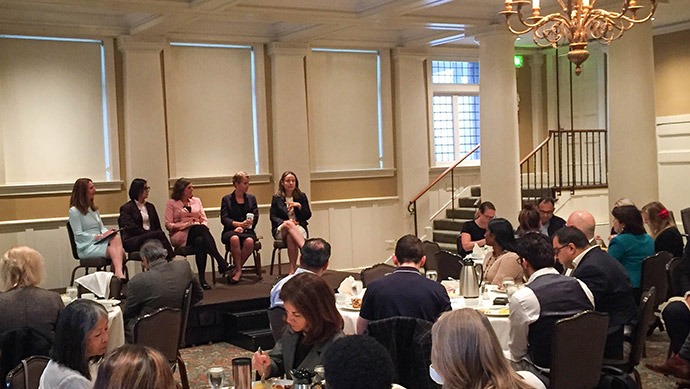
“Banking on Women” – a joint event, organized by Global Washington and the World Affairs Council, held at the Rainier Club on May 10, 2018. Photo: Andie Long/Global Washington.
“It’s really a no-brainer,” says Saara Romu, founder of Selkea, explaining the benefits of financial inclusion for women in global development. Not only does it increase countries’ GDP growth, but it improves the overall well-being of families and communities in developing countries.
Investing in women has repeatedly shown to be the fastest way to impact communities and increase ROI. For this reason, development organizations, the private sector, and policy makers are focusing on deliberate efforts to create access to financial markets for women.
A panel of distinguished women in the field of financial inclusion convened at the Rainier Club on May 10th through an event co-hosted by Global Washington and the World Affairs Council of Seattle.
Continue Reading
May 2018 Newsletter
Welcome to the May 2018 issue of the Global Washington newsletter.
IN THIS ISSUE
Letter from our Executive Director
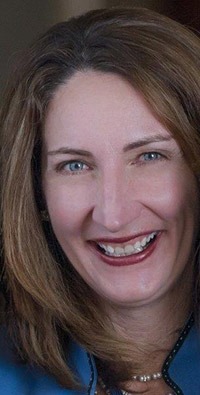
From the very first mile to the last, health is a critical component of global development. And when it comes to advancing global health, our Global Washington members have made incredible strides by combining the best of new technology with the relationships and trust built up within the communities they serve.
In this month’s newsletter, prepare to be inspired by VillageReach, whose work begins at the last mile, where health interventions are both the hardest to deliver and the most needed. I also hope you enjoy reading about the career twists and turns taken by PATH’s newest vice president of global engagement and communications, Elaine Gibbons.
Washington state is both an innovative and a practical place. It is here that we make cutting-edge breakthroughs, explore applications for those insights, and then forge ahead to find out what works for people in low-resource, low-infrastructure settings.
Last month, Global Washington co-hosted the United Nations Chief Information and Technology Officer, Atefeh Riazi, along with Tableau and Seattle Pacific University. Ms. Riazi noted that she felt inspired by so many innovative non-profit and for-profit organizations in our region that are using the best technology and information available to tackle the Sustainable Development Goals. This may be no surprise to us, but it does demonstrate the growing recognition of our state as a hub for global development and innovation.
Together, we’re making the world a healthier, more equitable, and prosperous place.

Kristen Dailey
Executive Director
Back to Top
Issue Brief
How Technology & Innovation are Accelerating Progress in Global Health
By Andie Long
In April, the United Nations Chief Information and Technology Officer, Atefeh Riazi, visited Seattle, where she met with numerous companies and non-profits, including many Global Washington members. The purpose of her meetings was to explore how the UN can support globally-minded organizations in using information, technology, and innovation to accelerate progress toward the 17 Sustainable Development Goals – also known as The Global Goals.
Just prior to Ms. Riazi’s visit, the UN had announced the adoption of Tableau Software globally, an effort intended to visualize trends in the data and improve the way Member States use data to inform decision-making. Despite some gaps in the data, the global development community is forging ahead and doing everything in its power to move the needle.
Ms. Riazi has said she believes the for-profit sector has an important role to play, alongside the non-profit sector, which already has been expanding and deepening its use of new technologies and innovative solutions.
Without a doubt, the challenges are immense, and UN Member Countries have set ambitious targets to reach by 2030. In this issue, we’ll take a closer look at the global health goal.
In a 2017 assessment, the UN noted that major progress had been made on Sustainable Development Goal 3 (“Ensure healthy lives and promote well-being for all at all ages”). Yet, in order to meet its own aggressive targets, several key areas would require special attention. Chief among them were reproductive, maternal, newborn and child health; infectious diseases; and a focus on health systems strengthening.
REPRODUCTIVE, MATERNAL, NEWBORN, AND CHILD HEALTH
When it comes to preventing unintended pregnancies, universal access to sexual and reproductive health care is critical. In 2017, the UN reported that 78 percent of women of reproductive age worldwide who were “married or in union” felt that their family planning needs were satisfied through modern contraceptives. This represents an increase of three percentage points since 2000. Remarkably, in the least developed countries, there has been an 18 percentage point increase over the last seven years.
The Gates Foundation has said it is dedicated to reaching an additional 120 million women and girls in the poorest countries by 2020 with high-quality contraceptive information, services, and supplies. Its long-term goal is for every woman to have access to voluntary family planning.
Read Global Washington’s conversation with PATH Director of Reproductive Health, Martha Brady.
One product that reproductive health experts are particularly excited about is a novel injectable contraceptive that was developed by PATH and manufactured by Pfizer. Referred to as subcutaneous DMPA, or Sayana® Press, the long-lasting contraceptive is injected every three months. The product itself combines the drug and a needle in a prefilled, single-use Uniject™ device – another PATH invention. Because of its user-friendly design, it can be administered by trained community health workers, pharmacists, and women themselves through self-injection.
Moving from reproductive health to the health of infants and young children, it’s worth celebrating the fact that the mortality rate for kids under five years old has fallen 44 percent since the year 2000. However, in sub-Saharan Africa the rate remains stubbornly high.
World Vision has spent the last decade equipping community health workers with cell phones and other technology tools to help them reach more people and improve the quality of care they can provide to pregnant women and caregivers. World Vision currently has mHealth initiatives in 11 countries in Africa, South Asia and Southeast Asia, and the organization is increasingly utilizing new types of information and technology solutions, including customized vehicles to ensure vaccine cold chain in South Africa, and iris-scan technology to monitor Ebola vaccine trial participants in Sierra Leone.
INFECTIOUS DISEASES
When it comes to infectious diseases overall, one of the major risk factors is the lack of safe water, sanitation and hygiene (WASH) services. Today there are many more effective and affordable water filtration and purification options available.
PotaVida, for example, provides a simple-to-use solar water purifier for households in disaster relief and refugee contexts. What’s more, the product records its own usage, sending those data in real-time to field staff so they can track whether families are using the devices correctly and how often. Other products on the market have been designed for community use in post-disaster settings.
In a recent TEDxSeattle talk, PATH CEO and President Steve Davis heralded an exciting time in global health. Today, he said, we have new ways to fight old diseases, “giving us the power to banish some of the worst killers from the earth.”
Not only is the global health community making extraordinary gains toward eliminating diseases like malaria, but it is also increasingly partnering with the private sector to make rapid data-informed decisions that can save lives.
Read how the Global Washington community is working to eliminate malaria.
The partnership between Microsoft and Medical Teams International offers a great example. Thanks to digital data capture and real-time monitoring efforts in the field, Medical Teams International was able to halt an emerging cholera outbreak in refugee settlements in Uganda.
In addition to the known killers, new diseases such as SARS, Ebola, and Zika have also emerged at a frightening rate. The Ebola outbreak in particular helped catalyze a new vaccine development collaboration called CEPI, the Coalition for Epidemic Preparedness Innovations. Funded by the Bill & Melinda Gates Foundation and the Wellcome Trust, as well as the governments of Germany, Japan, and Norway, the coalition is focused on vaccines for the next pandemic disease.
HEALTH SYSTEMS AND FUNDING
One of the most challenging targets to meet within SDG 3 is strengthening the capacity of health systems in developing countries, and around the world, to provide early warning, risk reduction, and management of health risks at the national and global level. According to the UN’s own progress assessment, in the least developed countries, for every 1,000 people there are fewer than three nurses or midwives and just a fraction of one physician. This shortage of medically trained staff puts greater pressure on health systems across the board.
Americares is a great example of a health-focused relief and development organization that’s not just responding to people’s medical needs in an emergency, but also evaluating ways to help strengthen and build capacity in local health systems for the future. Expert at moving large amounts of medicines and medical supplies on short notice, the organization has created an app for its partners called the Field Inventory Tracker, or Fit Tool.
On a larger scale, VillageReach’s OpenLMIS (logistics management information system) supports health commodity supply chain managers in low-infrastructure settings. Starting first in Mozambique, OpenLMIS is now in use in eight countries.
Shifting from tracking medical supplies to tracking patient care, another tech solution that was developed by Global Washington member Max Foundation monitors the needs of cancer patients in low-resource settings. The Patient Access Tracking System, or PATS®, is used by healthcare professionals who access cancer treatment through the foundation. The platform is currently used to monitor and maintain treatment access for more than 35,000 patients in more than 70 countries.
* * *
Learn more about how Global Washington members are using technology and innovation to improve global health outcomes:
American Cancer Society. Fighting cancer in lower-resourced nations has its challenges, but the American Cancer Society (ACS) is working globally to bridge the gap so that all people share the victories of the war on cancer. To focus on the treatment gap, more than 40 oncologists from 12 countries in Sub-Saharan Africa recently came together to establish the African Cancer Coalition. This group aims to scale up high-quality cancer treatments for patients. The ACS, Clinton Health Access Initiative, National Comprehensive Cancer Network® and the IBM Health Corps are partnering with the African Cancer Coalition to make this vision a reality. Together they want to ensure that every cancer patient is given the chance to survive and thrive. cancer.org
Americares saves lives and improves health for people affected by poverty or disaster so they can reach their full potential. Americares responds to an average of 30 disasters each year, shipping medicine and medical supplies and restoring health services to maintain access to health care for survivors. Americares leverages technology, including an app called the ‘Fit Tool’ developed to manage and track large shipments of medicine and supplies in the field and share that information with partners in real time. By collaborating with partner organizations and by using technology that helps improve the efficiency and effectiveness of its health programs, Americares is able to reach vulnerable families with critical health programs, medicine and supplies. americares.org
The Center for Infectious Disease Research (CIDR) is the world’s largest independent, non-profit research institute devoted exclusively to infectious diseases. Established 42 years ago, before Seattle became known for global health innovation, CIDR began addressing those diseases that disproportionally affect people in poverty. The organization applies cutting-edge scientific approaches to generating breakthroughs in the fight against TB, malaria, HIV/AIDS and other infectious diseases and, as result, broadens understanding of human health. cidresearch.org
Global Good combines Intellectual Venture’s unique invention prowess with the expertise of leading humanitarian organizations, forward-looking governments, and commercial partners. The organization invents, develops, and deploys commercially-viable technologies that improve life in developing countries. In the fight against malaria, Global Good has created an improved rapid diagnostic test to detect low levels of malaria parasites in a person’s bloodstream. It has also developed an automated microscope to help untrained individuals accurately diagnose malaria. intellectualventures.com/globalgood
The Max Foundation works to increase global access to treatment, care, and support for people living with cancer. The foundation’s efforts are made possible through a proprietary, real-time, client relationship management tool – the Patient Access Tracking System (PATS®). Developed in-house, the PATS® platform empowers Max Foundation’s partner physicians, program managers, and program coordinators to seamlessly align their efforts at the individual patient level – ensuring the right drug is delivered to the right patient in the right dose at the right time. In total, the PATS® platform helps monitor and maintain treatment access for more than 35,000 patients spread across 70+ countries. themaxfoundation.org
Medical Teams International. The world is facing a refugee crisis on a scale it has never known. Crowded conditions, poor sanitation, and inaccessible healthcare in refugee camps can quickly escalate into disease outbreaks and staggering levels of suffering. Through an innovative partnership with Cambia Health Solutions and Microsoft, Medical Teams International has developed a mobile app to replace slow, cumbersome paperwork processes and track real-time medical data. Now, healthcare workers at refugee settlements in Uganda are empowered to monitor and stop disease outbreaks before they reach epidemic levels. medicalteams.org
MSR Global Health is a leading innovator and manufacturer of low-cost, field-proven products that improve access to basic human needs for people around the globe. With nearly 50 years of technical engineering and manufacturing expertise, MSR Global Health is developing technologies that increase access to vital needs such as clean water. SDG 3 recognizes that a major risk factor for infectious diseases and mortality is the lack of safe water – with MSR Global Health technologies, water-related diseases can be prevented and treated. msrglobalhealth.com
NetHope. For more than a decade, NetHope has collaborated with its nonprofit members and innovative technology partners to meet the demands of vulnerable communities around the world. This cross-sector collaboration allows for better programs, mitigation of risks, and scaling benefits for greater impact in the communities in which NetHope works. By delivering information technology solutions to the developing world, NetHope helps nonprofits become more effective to achieve great strides for the underserved, and provides tech companies the opportunity to leverage their tools and ideas at scale across the entire sector of development to create successful outcomes, promoting the health and wellbeing for at-risk communities. nethope.org
PATH uses technology and innovation to open the door to healthy lives and well-being for people everywhere. A global team with expertise in science, business, advocacy and dozens of other disciplines, PATH drives responsive solutions to a wide spectrum of health challenges: developing contraceptives that fit women’s lives; advancing digital tools that empower front-line malaria fighters with real-time data; pioneering new models for HIV prevention and care; advancing vaccines that protect children from diseases; and much more. By partnering with businesses, governments, and communities, PATH takes high-quality, affordable health solutions all the way to scale—because when people everywhere have a path to good health, communities, countries, and economies thrive. path.org
PotaVida enables aid organizations to make better decisions by collecting accurate data from the field in real time and distilling it into actionable insights. To realize this, PotaVida creates technical solutions that work, are simple to use, and result in dramatic benefit to people in need. The company’s first product, the Smart Solar Purifier, disinfects water using just sunlight for household use in disaster relief and refugee contexts. In addition to providing safe drinking water at a dramatically lower cost, every Smart Solar Purifier records its own usage data. This data is downloaded to mobile devices to provide instantaneous feedback in the field, and is also synced in the cloud, analyzed at the program level, and sent to decision makers. potavida.com
Splash is a non-profit organization that delivers water, sanitation and hygiene (WASH) solutions for kids. They work in Asia and Africa in some of the fastest growing cities in the world, where they focus on child-serving institutions to help kids and their families lead healthier lives. Splash has completed over 1,600 projects across eight countries, serving more than 400,000 children. Their five-year goal is to reach 100% of government schools in Addis Ababa (Ethiopia), Kathmandu (Nepal), and Kolkata (India), benefitting one million children. To track their impact, Splash works with corporate partners like Tableau to visualize and share its data. splash.org.
The Tableau Foundation is an initiative led by the employees of Tableau Software (NYSE: DATA) that encourages the use of facts and analytical reasoning to solve the world’s problems. Tableau Foundation grants combine Tableau’s two most valuable resources – its people and its products – with financial support to nonprofits that are using data to reshape communities around the globe. Since 2015, Tableau Foundation and PATH have partnered to provide vital software, training, and funding in support of Zambia’s goal of eliminating malaria by 2021. The partnership empowers frontline health workers with the critical tools to track and treat malaria cases to help eliminate this deadly disease. tableau.com
VillageReach works with ministries of health to solve health care delivery challenges in low resource communities. We are building on a rich history of leapfrogging technologies that can overcome both geographic and social distance. Electronic data capture helps us ensure the right health products are available at the right time and place. UAVs are being tested to address availability of blood in emergencies and access to routine health products. Mobile phones are allowing adolescents to anonymously call a health hotline. These technologies are helping VillageReach create a more responsive health system that can better manage current and emerging health threats. villagereach.org
World Vision. Mobile technology is ubiquitous: there are more than 5 billion wireless subscribers globally with greater than 70% in low and middle income countries. World Vision is leveraging “mHealth,” or mobile health, applications among thousands of community health workers to improve people’s health, especially in countries where access to healthcare is severely limited. World Vision’s health, nutrition, water and sanitation, and disaster management experts are all using digital technology to help ensure life in all its fullness for children in the communities with which it works. You can view the 2018 World Vision mHealth Report and learn more about World Vision mHealth Programming at wvi.org/mHealth.
Back to Top
Organization Profile
VillageReach
By Joanne Lu
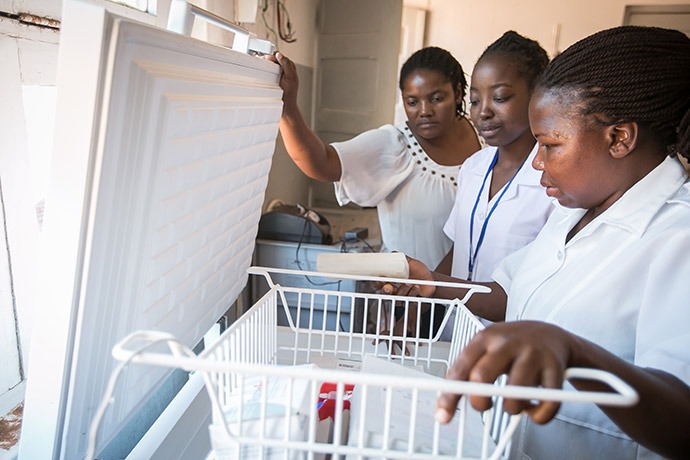
In Mozambique, VillageReach uses technology to help ensure refrigerators are keeping vaccines at the right temperature. Photo: Paul Joseph Brown for VillageReach. 2016. Mozambique.
VillageReach is on a mission to solve complex health-care delivery challenges in low- and middle-income countries. They’re all about the “last mile” – not just reaching it, but starting there.
The phrase “last mile” might be more familiar to some in the context of telecommunications, in which it describes the final leg that networks have to span to get their services to end-users.
“That final segment…is the most critical, but also the most challenging and expensive piece of the value chain,” VillageReach President Emily Bancroft explained. “But if the systems don’t work for people at the last mile, they have limited value.”
The telecom reference not incidental – the organization was founded by Cameroonian-American telecom executive Blaise Judja-Sato. What is incidental, though, is the encounter that inspired him to start an organization dedicated to tackling the challenges of delivering healthcare to the people who need it the most.
In 1999, Judja-Sato found himself on a plane with Graça Machel, a respected humanitarian and activist for women and children’s rights and health, as well as widow of both the former President of Mozambique Samora Machel and former President of South Africa Nelson Mandela. Mrs. Machel was newly married to Mandela at the time.
When Judja-Sato struck up a conversation with Mrs. Machel on the plane, she urged him to visit Mozambique. She asked him to see for himself the challenges the people were facing. At the time, Mozambique was still emerging from a 15-year civil war. It had also just been hit with a devastating flood. Aid and resources were pouring in, but because of the mere physical dimensions of the country, communities in the north part of the country were completely cut off.
According to Bancroft, Mozambique is roughly the size and shape of Oregon, California and Washington combined. The capital, Maputo, is down south by San Diego comparatively. Aid response to the flood was being sent to Maputo, but without sufficient infrastructure, it was nearly impossible to deliver any of it to the people up north who needed it the most.
Judja-Sato was so impacted by what he witnessed in Mozambique that upon his return, he formed a group of advisors (including PATH Senior Advisor Emeritus Michael Free) to research and discuss what could be done. They noted, too, that even though a lot of new technology was emerging in the sector, there still wasn’t an effective system for making sure those solutions and other life-saving resources actually reached the last mile.
In 2000, Judja-Sato, along with Craig Nakagawa, Lionel Pierre, and Didier Lavril, launched VillageReach. They began with supply-chain interventions in Mozambique to deliver child health vaccines, because Mrs. Machel was already very engaged with that issue.
Since its founding, VillageReach has worked in 13 sub-Saharan African countries and Pakistan, but its three “core countries” are Mozambique, Malawi, and the Democratic Republic of the Congo.
The core countries are those in which VillageReach has long-term commitments, with people on the ground and a deeper knowledge of the context. It’s in those three countries that they test innovations, before identifying partners that can scale the solutions in other countries and VillageReach can eventually hand it off to others entirely.
“The ideas we’re coming up with and the ideas we’re helping test – they’re not bleeding edge innovations,” Bancroft said. “[It’s] usually an approach that’s been tried in another environment that hasn’t been tried in the last mile. Or it’s a trend that we’re seeing globally but, again, it hasn’t actually fully been tested, implemented and proven that it can have value for people in low-resource communities.”
According to Bancroft, VillageReach sits between the “true innovators” and large-scale partners that work with multiple governments – like UNICEF, for example, which is currently managing a VillageReach solution to improve child vaccination supply chains in Pakistan.
So what makes a good “last mile” solution? Over the years, VillageReach has learned that it’s about more than just delivering products. It’s also about addressing systemic barriers that limit how well products are used. In fact, the three main challenges they’re working to address are related to people, data, and products. That means comprehensive interventions may include supporting health workers, enabling collection and use of data, or even ensuring that clinics have sustainable sources of energy so that delivered vaccines don’t go bad.
For VillageReach, it’s always been critical to figure out how technology works best in low-infrastructure settings. But Bancroft says that often the question is, “What does technology really mean, and how do you work with what you have?”
For example, VillageReach set up a mobile-based health hotline in Malawi in 2011. It’s essentially a toll-free number that connects callers to trained health-care providers. The technology employed is relatively simple, but as VillageReach and the government prepare to scale up or even replicate the program in other countries, they’re now looking into more advanced technologies, like artificial intelligence (AI), to help defray government costs.
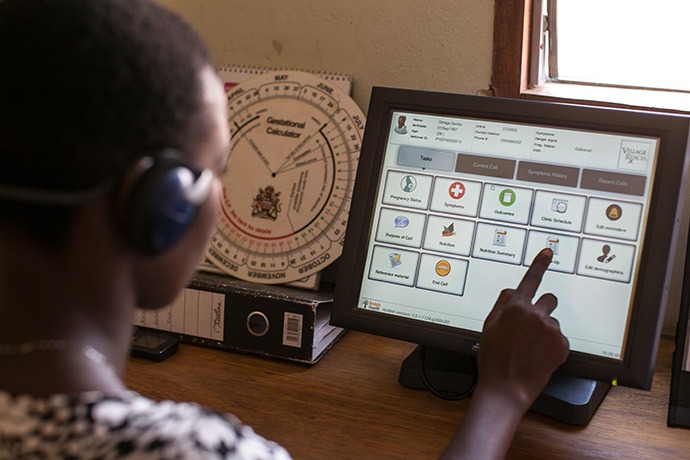
Trained hotline nurses provide free health and nutrition information to people in communities throughout Malawi. Photo: Paul Joseph Brown. 2016. Balaka, Malawi.
Drawing on the success of Logitistimo in India, VillageReach is also in the planning stages of a ride-sharing platform for transporting lab samples. They’re calling it “Sample Taxi.” Bancroft says it’s not that there isn’t transportation where they work. Rather, the transportation isn’t always well-managed and organized. In fact, she says there are already many trucks that travel between health facilities; they just don’t communicate or cooperate. With Sample Taxi, VillageReach hopes to not only make the transportation that exists between health facilities more efficient, but to also include the private sector.
One technology-based intervention that has been particularly successful is the OpenLMIS (logistics management information system) initiative, which allows supply chain managers in low-infrastructure settings to manage all their health commodities electronically. What began as VillageReach’s early work in Mozambique, designing supply chain technology, has now been scaled in eight countries with more than 20 collaborating partners, including PATH and USAID.
But Bancroft noted that whether it’s about implementing technology or developing interventions, for VillageReach, the most important thing is that the system is easiest and best for the end-user. She says that’s why VillageReach changed its tagline six years ago from “going the last mile” to “starting at the last mile.”
In the case of tech-based solutions, that often means putting a greater emphasis on streamlining, so that health workers aren’t juggling different devices for every tool. It also means doing more to protect the privacy of those from whom data is being collected, especially as governments continue to adopt more digital services.
But 10 years from now, Bancroft says she hopes VillageReach has created enough of an evidence base, inspired improvements, and catalyzed others so that the three main issues they’re currently focused on –people, data, and products– are being taken care of by the governments themselves and their partners.
“Then, VillageReach can move on to the next layer of challenges,” Bancroft said.
Back to Top
Changemaker
Elaine Gibbons, PATH Vice President of Global Engagement and Communications
By Joanne Lu
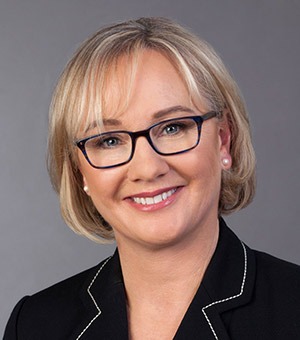
Photo provided by PATH.
Earlier this year, global-health giant PATH named Elaine Gibbons vice president of global engagement and communications. Even as a student, Gibbons wanted to make a global impact. But to arrive at her current position, she’s taken an unexpected and circuitous journey across continents and into the world of business – a journey that’s equipped her with skills she now leverages to build partnerships that span sectors and industries and maximize impact.
Gibbons was born in the UK to parents who were both strongly committed to social justice issues. At the age of five, she got her first taste of life outside the West, when her family moved to India for a year. Her father was a scientist with the UN.
“I suppose that really shaped my experience of the world,” she said. “This was when India was a closed economy and a really different place to be than southern England in 1975.”
After finishing her first year of schooling in India, Gibbons and her family moved back to the UK, where she eventually studied English history and politics in university. Her plan was to do VSO (Voluntary Service Overseas). But when VSO suggested she get some experience first, she moved to Japan to teach for a year. There, she met an American, and her life was suddenly propelled in a different direction: she got married and moved to Seattle.
In Seattle, Gibbons embarked on a 13-year career with Russell Investments.
“I think if you had said to me when I was at college, ‘You’ll work for a large asset-management organization – a big investment company,’ I would have said that was nonsense.”
But reflecting on her time at Russell, she says the opportunities she got there were invaluable in teaching her about business, leading teams, and doing “transformational work.”
“That really kept me interested and invigorated, even though it wasn’t the area that I had originally anticipated I’d be in,” she said.
But even at Russell, she was drawn to global work, and eventually moved to Bangalore for two years to run the company’s India operations. (Interestingly, her son spent his first year of school there, just as she did.) But by 2012, Gibbons was ready for change.
“I concluded that I needed to continue to do global work in a complicated environment that had a lot of change management and evolution,” she says. “I wanted something that was mission-driven.”
She took a year off work, and during that time, prominent members of both the for-profit and non-profit communities suggested that she look into PATH. The global-health giant, they said, would fulfill everything she was looking for in a position.
At the same time, PATH was looking for someone with a business background to help transform their transactional and technical engagements with the corporate sector into more “strategic and market-shaping” partnerships, as Gibbons explained it.
In 2013, Gibbons joined PATH as the executive director of global corporate engagement. Her goal was to create a platform that would broker strategic relationships, primarily across the life science and technology sectors.
“The sustainable development goals can’t be met without active and sustained engagement from the private sector,” Gibbons said. “[That recognition] is driving a lot of the multi-sector partnership work that is happening across the development space – a recognition that governments alone can’t do it; NGOs and the social sector alone can’t do it [either]. We need the engagement of the private sector, but we need the private sector to engage deeply.”
She says it’s not just about corporate philanthropy, corporate social responsibility, or the exchange of technical expertise – all are important, but they’re even better in combination.
“I think what we recognized is that we had all the technical touchpoints, but we hadn’t brought them together around a strategic intent, and that strategic intent was to provide greater impact through more effective multi-sector partnerships.”
For example, the Visualize No Malaria initiative brought together PATH’s global health expertise, Zambia’s Ministry of Health, and eight tech companies – Tableau, Alteryx, DataBlick, DigitalGlobe, Exasol, Mapbox, Slalom, and Twilio – to create data-based solutions that help health workers deploy tools and medicine more rapidly and effectively. The program has been such a success that they are now looking to expand beyond Zambia into other countries committed to elimination.
Gibbons noted that ultimately, these types of partnerships are most impactful at the country-level, where building capacity in such a way leads to sustainable development across all sectors involved.
And according to Gibbons, PATH’s dedication to technology innovation is crucial for achieving that kind of impact. Not only does technology keep PATH on the leading edge of vaccines and product development, but improving business technologies and other shared services at the Seattle office also allows the organization to be stronger for its in-country partners. She especially sees this in her new role overseeing her former department of strategic private sector work as well as marketing and communications, philanthropic development and advocacy and public policy.
Over the next decade, Gibbons is excited to see PATH continue to leverage technology to remain a leader in global health and service innovations and to do so in a way that builds capacity and partnerships at the country-level.
As for herself, perhaps the in-country multi-sector partnerships she’s helped build will be so strong that she’ll be enjoying a cocktail on a beach with Global Washington’s Kristen Dailey and other leading ladies of the industry, she suggested with a laugh. Otherwise, she’s just going to continue dedicating herself to work that has a sustainable impact on broad systems.
Back to Top
Welcome New Members
Please welcome our newest Global Washington members. Take a moment to familiarize yourself with their work and consider opportunities for support and collaboration!
CARE
Founded in 1945 with the creation of the CARE Package®, CARE is a leading humanitarian organization fighting global poverty. CARE places special focus on working alongside women and girls because, equipped with the proper resources, they have the power to lift whole families and entire communities out of poverty. That’s why women and girls are at the heart of CARE’s community-based efforts to improve education and health, create economic opportunity, respond to emergencies and confront hunger. Last year CARE worked in 93 countries and reached 63 million people around the world. Learn more at care.org.
Back to Top
Member Events
May 17: Washington Global Health Alliance // Planetary Health Roundtable
May 19: World Vision // The 2018 Global 6K for Water
May 24: World Affairs Council // Global Health – Building Country Capacity
May 24: University of Washington // Culture and Identity in the Syrian Christian Tradition
May 30: Washington Nonprofits // Strategic Planning in Nonprofits
June 10: Washington Global Health Alliance // Dinner with the Pioneers of Global Health Award Winners
Back to Top
Career Center
Program Associate, Mobility Outreach International
Development Coordinator, Planned Parenthood
Digital Workspaces Coordinator, PATH
Public Relations Specialist, Committee for Children
Check out the GlobalWA Job Board for the latest openings.
Back to Top
GlobalWA Events
May 30: Menstruation Matters: Innovations and Partnerships for Dignity, Health, and Opportunity
June 21: Shaping the Future of Sustainable Sourcing
SAVE THE DATE: GlobalWA 10th Annual Conference: December 6
Back to Top
Reflections on Global Washington’s Event, “Women Hold Up Half the Cup: Empowering Women in Coffee-Growing Regions of the World”
By Ulrike Hoessle
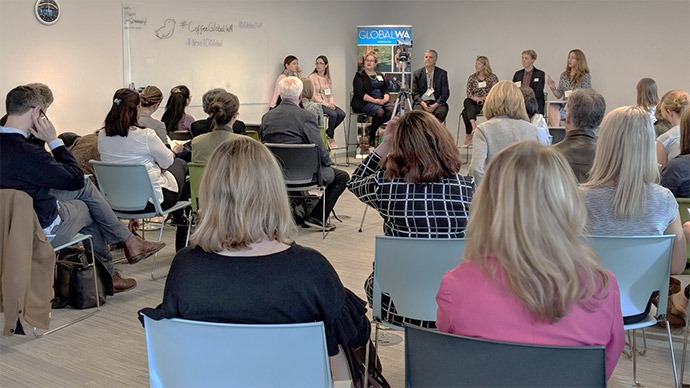
Global Washington reception on women’s empowerment in coffee-growing regions.
Speakers included Andrea Ribeiro Gonçalves Mendes, COOPFAM; KJ Zunigha, Global Partnerships; Frank Rubio, Oikocredit; Kelly Goodejohn, Starbucks; Colleen Anunu, Fair Trade USA; and Kristen Dailey, Global Washington. Photo by Hanna Hwang.
In April 2018, the Global Specialty Coffee Expo returned to Seattle – the “world’s capital of coffee,” according to Global Washington Executive Director, Kristen Dailey. To mark the occasion, Global Washington held a reception alongside the Expo to highlight how its members are working towards women’s empowerment in coffee-growing regions of the world.
Continue Reading
Key Travel Survey Reveals Jump in Last Minute Travel Booking, Increased Use of Sharing Economy Platforms, and Heightened Travel Risk Awareness
Posted on April 26, 2018.
By: Sean Kelly, President – Key Travel US
Every year, Key Travel distributes an annual survey to travelers and travel organizers at over 350 organizations across the NGO, academic, and faith sectors. This survey helps us capture valuable insight into the policies, attitudes, and preferences of our unique client base. This year’s results gave us a better understanding of our clients’ booking preferences, safety and risk management strategies, and travel trends.
Some interesting findings include: an increase in travel being booked by email or online, often outside of normal business hours, and at the last minute. We also observed an increase in the use of sharing platforms when traveling for work, such as booking accommodations through Airbnb. While the survey results saw a decrease in security felt by travelers, there was a positive uptick in management strategies to mitigate risk to the traveler.
Continue Reading
How IDEO’s Design-Thinking Methodology Supports Innovative Solutions to Global Challenges
Posted on April 19, 2018.
By Ulrike Hoessle
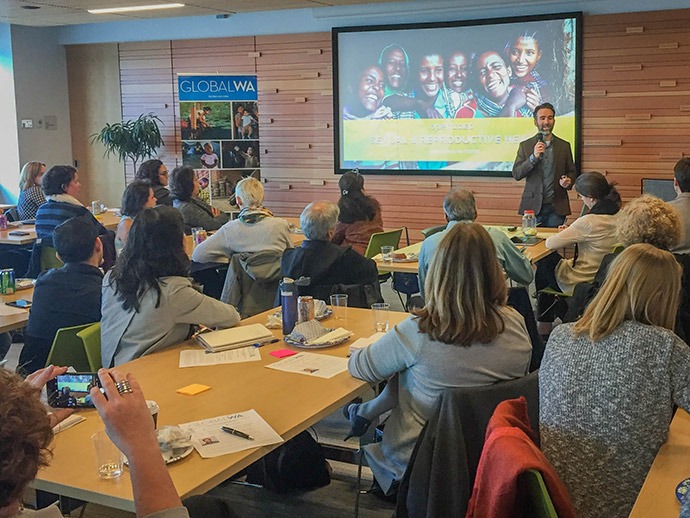
What if you could engage people around the globe to generate ideas and solutions for the challenges you are trying to solve?
As Managing Director of OpenIDEO—IDEO’s open innovation practice— Jason Rissman is collaborating with a worldwide community to tackle societal and environmental challenges. In a workshop at Global Washington on April 2, Jason presented IDEO’s human-centered design methodology.
Continue Reading
April 2018 Newsletter
Posted on April 17, 2018.
Welcome to the April 2018 issue of the Global Washington newsletter.
IN THIS ISSUE
Letter from our Executive Director

Over the past several years, Global Washington has elevated the importance of the people and ecosystems that supply your daily cup of coffee. Coffee is predominantly grown in lower- and middle-income countries, and issues of income disparity and a changing global climate have a dramatic impact on the lives of people who make their living within the coffee industry.
This year, Global Washington has taken a closer look at the disparity between men and women in the coffee supply chain. Although women play major roles in the early stages of coffee production – laboring in the field, harvesting coffee cherries, and processing the beans – men typically have the more lucrative roles of transporting and marketing the product.
Fortunately, several Global Washington members, such as Oikocredit, Fair Trade USA, Global Partnerships, and Starbucks, are working to close this gender gap and empower women in coffee-growing regions. So grab a cup of coffee (or tea, if that’s more your thing) and read about their stories below.
In addition to coffee, there are some other fascinating topics coming up. Global Washington will be partnering with Tableau Foundation and Seattle Pacific University to bring you an inside look at how data and technology are advancing the Sustainable Development Goals. Ms. Atefeh Riazi, the United Nations Chief Information and Technology Officer, will be speaking at a free public event on April 25. We are also partnering with the Seattle International Foundation and Pangea on May 16 to examine current issues of migration from Central America. And lastly, save the date of May 30 for an event with PATH and Days for Girls around World Menstrual Hygiene Day. More information on that event will be coming soon.

Kristen Dailey
Executive Director
Back to Top
Issue Brief
Women Hold Up Half The Cup
Gender Imbalances in the Production of America’s Most Popular Beverage
By Erika Koss
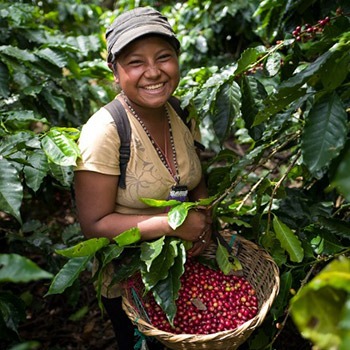
Woman picking coffee cherries in Matagalpa, Nicaragua. Photo: Gwenn Dubourthoumieu
At least two dozen pairs of human hands are involved in the production of a single cup of coffee. And many of those hands belong to women. This month, in honor of the Global Coffee Expo—the Specialty Coffee Association of America’s annual conference, held in Seattle from April 19-22—Global Washington has focused on an important issue within the coffee sector: Gender Equality.
In their internationally bestselling book Half the Sky: Turning Oppression into Opportunity for Women Worldwide, Nicholas Kristof and Sheryl WuDunn observe that if the moral challenge of the 19th century was slavery, and the 20th century’s battle was against totalitarianism, then the 21st century’s “moral challenge will be the struggle for gender equality around the world.”
A recent Specialty Coffee Association of America (SCAA) paper, “A Blueprint for Gender Equality in the Coffeelands,” summarizes some of the challenges that female farmer-producers face: “Overall, women earn less income, own less land, control fewer assets, have less access to credit and market information, greater difficulty obtaining inputs, and fewer training and leadership opportunities.”
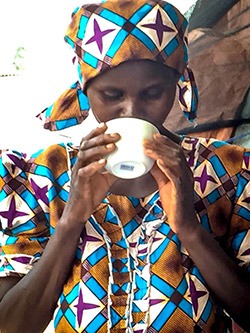
A coffee farmer enjoys a cup of coffee at a tasting event (called a “cupping”), at the Nyampinga Cooperative, a women’s coffee cooperative in southern Rwanda. Photo: Erika Koss.
All the world’s coffee grows between Earth’s imaginary lines of latitude, the Tropic of Cancer (235 North) and the Tropic of Capricorn (235 South). Coffee aficionados know this zone as the “Bean Belt.” Within the more than 75 coffee-producing countries encompassed by the Bean Belt, there are significant economic disparities between male and female coffee producers.
The SCAA Sustainability Council finds that this gender gap in coffee value chains is most prevalent in four key areas: 1) distribution of labor, 2) income, 3) ownership, and 4) leadership and decision-making.
Many inequalities at the farm level are rooted in the “double burden” that women experience while managing both the farm and the household (which regularly includes at least several children and the elderly). Research shows that women perform most of the fieldwork, harvest work, and processing of coffee. Men often conduct the transport, export, and marketing of coffee—jobs that regularly provide a higher wage and take them away from the farms and their families.
One of the major challenges for rural women throughout Asia, Africa, and Latin America, are the customary land laws that prohibit women from owning their own land. As a Gender Issue Brief by Sweden’s development agency explains, less than 20% of agricultural women own their land, which is a major challenge since land ownership is linked to food security and poverty reduction.
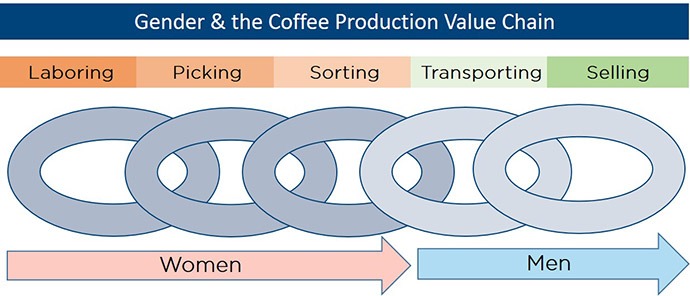
In addition to identifying the major challenges in gender disparities, the SCAA provides several recommendations for reducing inequities between men and women in coffee:
- Include women and men equally in technical training: Traditionally, women in coffee have been excluded from technical trainings, but in recent years, this is starting to change thanks to organizations such as TWIN Trading. Their gender-inclusive approaches have proven successful in East Africa where mixed-gender programs focus on sustainable agriculture, financial management, and improving coffee quality.
- Promote community-driven initiatives that encourage balanced households: Working directly with farmer households to build greater gender balance takes time, but it can lead to transformative and lasting change in coffee-growing communities.An excellent example of this is the Gender Action Learning System (GALS), which was co-created by sociologist Linda Mayoux with a coffee cooperative in western Uganda, Bukonzo Joint. The methodology is designed to increase the visibility of female farmers along the coffee value chain and to enhance women’s decision-making power at the household level. GALS helps women gain greater control over assets and ensure they have more equal access to income within their households. Since the original project in 2004, GALS has been implemented in other coffee-growing communities including Colombia and Rwanda.
- Empower women and men equally with access to financial resources: Economic empowerment can only be achieved through increasing women’s access to land, income, and credit. If this can be achieved, it has the potential to dramatically improve coffee quality, increase productivity, and alleviate poverty.
- Research gender equality in the coffee industry: There is much we still do not know about the best ways to elevate women’s roles throughout the coffee supply chain. The International Women’s Coffee Alliance is a non-profit organization founded in 2003 that organizes women in coffee-producing countries. Their Research Alliance works toward increased awareness and funding for much-needed research regarding gender and coffee. In the last few years, their newly formed data-gathering initiative estimates that in three coffee-producing countries (Costa Rica, El Salvador, and Rwanda), there are more than 135,000 female coffee producers, approximately 30 percent of the total.
- Advocate for gender equality: We all have a role to play in helping address the gender pay gap in coffee production. In 2014, the Coffee Quality Institute founded the “Partnership for Gender Equity”—a set of principles created to guide the coffee industry forward.The women, whose hands nurture coffee seedlings, pick coffee cherries from trees, and sort “parchment beans” after processing are vital to a complex global supply chain. But there are an uncounted number of women involved in exporting and importing green coffee beans, as well as roasting, grinding, packaging, and brewing.It is time women at all these stages of coffee production are recognized and fairly compensated. Because from farmer to barista, women hold up—at least—half the cup.
***
By increasing women’s access to land, credit, market information, agricultural inputs, and training, the following Global Washington members are working to ensure greater gender equity in coffee production.
Eastern Washington University professor, Julia Smith, teaches anthropology and researches the high-end coffee market in Costa Rica. In her first encounter with women’s work in coffee in the 1990s, Smith observed that women worked harder than men during the coffee harvest. Day after day, they started early in the morning, preparing meals for the family, then picked coffee all day, and finally finished up by washing clothes and collapsing into bed. Today, more women are taking on leadership roles in producing coffee for the specialty coffee market, making decisions about what varieties to grow, how to process it, and how to sell it.
Fair Trade USA is a nonprofit organization and the leading certifier of Fair Trade products in North America. Their rigorous standards around the production of coffee help protect fundamental human rights, ensure safe, healthy working conditions, protect the environment, and deliver additional economic resources to producing communities. In addition to these requirements, Fair Trade also sets minimum prices to protect farmers when the market dips too low, and ensures that producers earn additional Community Development Funds to address their pressing needs. Many groups vote to spend this money on projects that benefit women, like cervical cancer screenings, scholarships, child care centers and microloans for income diversification.
Global Partnerships is an impact-led investor whose mission is to expand opportunity for people living in poverty. The organization invests in social enterprise partners who empower people to earn a living and improve their lives. Over the last 24 years, Global Partnerships has impacted more than 8.9 million lives in 19 countries across Latin America, the Caribbean and sub-Saharan Africa as a result of deploying $287 million in impact-led investments to 118 partners. Some of these partners include agricultural businesses and cooperatives that help smallholder coffee farmers, both women and men, increase their incomes and strengthen their economic well-being.
Landesa is a global organization that champions secure land rights for rural women and men. The majority of the world’s poorest people share three traits: they live in rural areas, rely on land for their livelihoods, and do not have secure rights to own, access, or use that land. Women are especially burdened. Although women comprise a large portion of the world’s agricultural labor force, women generally have weaker rights to land when compared to their male counterparts. Yet, secure land rights are a key factor in creating an enabling environment that increases women’s participation, profit, and benefit in agriculture and food systems. To close this gender gap, Landesa works with governments, civil society, and the private sector to conduct research and develop gender equitable laws and programming to empower women in emerging economies with secure land rights.
Oikocredit US promotes and facilitates the global work of Oikocredit International, a cooperative social investor that maximizes social and environmental impact through targeted investments to serve vulnerable groups. Led by a dedicated agricultural unit, Oikocredit invests across the coffee value chain with 41 partners in 12 countries. Oikocredit supports farmers with capacity building grants, education, and network services. In all investments, Oikocredit seeks to enhance women’s participation in leadership and to address women’s empowerment at the local level by supporting partners who have dedicated services and programs to address gender equality.
Seattle University was the first Fair Trade University in the Pacific Northwest. As part of the University’s journey to garner Fair Trade certification, Seattle University collaborated with the Universidad Centroamericana (UCA) – Managua to develop a new fair trade coffee. In partnership with farmers in the Nicaraguan cooperatives, they developed Café Ambiental, SPC, a student-run social enterprise. Other projects included developing a more sustainable way to treat coffee wastewater, and establishing a scholarship fund for coffee farmers’ children. Most recently, they collaborated with a gender-balanced cooperative in Penãs Blancas that promotes greater participation of women and young people.
Starbucks Since 1971, Starbucks Coffee Company has been committed to ethically sourcing and roasting high-quality arabica coffee. Today, with more than 27,000 stores globally, Starbucks is the premier roaster and retailer of specialty coffee in the world. In March, the Starbucks Foundation announced a partnership strategy to empower at least 250,000 women and families in coffee, tea and cocoa growing communities by 2025, including a new global partnership with the Malala Fund to promote girls’ education and expand leadership opportunities for young women in India and Latin America. The partnership adds to Starbucks’ ongoing social investments worldwide with organizations like Mercy Corps, Eastern Congo Initiative, and Heifer International.
Thriive’s mission is building shared prosperity in vulnerable, global communities. The organization makes pay-it-forward loans of up to $10,000 to ambitious small business entrepreneurs to grow their businesses and create desperately needed jobs. Unlike a bank or microfinance loan, ThriiveCapital loans are not repaid in cash, but by business donations of an equivalent value of job training, income-enhancing products, or basic necessities to disadvantaged community members. Thriive supports many different types of businesses, including coffee growers, roasters, and retailers in Nicaragua, Guatemala, Kenya, Cambodia, and Vietnam.
Woodland Park Zoo Since 1996, Woodland Park Zoo’s Tree Kangaroo Conservation Program (TKCP) has worked with the communities of Yopno-Uruwa-Som (YUS) to protect the endangered tree kangaroo and its rain forest habitat in Papua New Guinea. In 2009, TKCP partnered with the indigenous YUS landowners and their families to help address economic challenges. In collaboration with Woodland Park Zoo and Seattle-based coffee roaster Caffe Vita, the people of YUS have sold more than 75 tons of their shade-grown YUS Conservation Coffee directly to the international market. Coffee farming in YUS is a family affair, with both men and women playing important roles in its production. TKCP strives to promote gender equity by engaging women in technical trainings, management decision-making, and access to household income.
Erika Koss is a PhD candidate in International Development Studies at Saint Mary’s University in Halifax, Nova Scotia, where her research examines the geopolitics of coffee's supply chain of coffee with a focus on gender justice and climate change.
Back to Top
Organization Profile
Standing on the “Impact-Led Edge,” Global Partnerships Invests in Greater Gender Equity and Agricultural Livelihoods
By: Joanne Lu
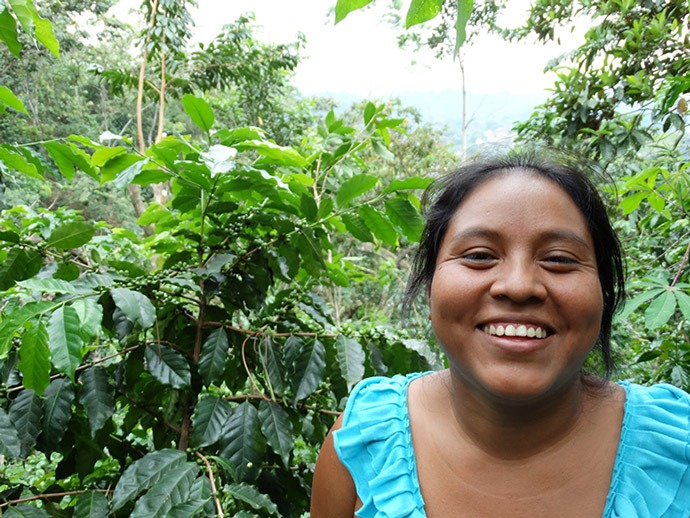
Woman farmer. Photo: Global Partnerships
For Global Partnerships (GP), impact at the household drives every investment. And often, that means investing in women.
GP was founded in 1994 as a grant-making nonprofit by Bill and Paula Clapp, whose vision also included the founding of Global Washington. GPs’ mission then – as it is today – is to expand opportunity for people living in poverty. Twelve years later the organization pivoted to being an impact-led investor to reach more people living in poverty.
Impact investments are made with the intention to generate positive social and environmental impact as well as a financial return. But GP isn’t just an impact investor. GPs’ Chief Impact & Research Officer, Peter Bladin, points out that the organization is an “impact-led investor.” Meaning their investments in social enterprise partners are first and foremost focused on making a sustainable positive impact in the lives of people living under $3.20 a day in sub-Saharan Africa or $5.50 a day in Latin America and the Caribbean (The World Bank’s regional poverty lines).
GP’s social enterprise partners currently span 19 countries. They also fall within GP’s 13 investment initiatives, including women-centered finance with education, urban sanitation, cookstoves, solar lights, health clinics, smallholder farmer market access and others.
“It’s a very broad spectrum, but it’s all driven by entities delivering products and services that are meaningful for households living in poverty,” Bladin said.
The organization launched each of its initiatives after extensively researching the most meaningful market-based solutions that would have a sustainable impact at the household level in the regions it serves. These initiatives are the guidelines for the types of social enterprises (or “partners”) GP invests in.
“Our Initiatives carefully focus on who the target audience is, such as women under a certain poverty level, and what is delivered to them, such as loans plus education,” Bladin said. “This very focused definition on the “who” and the “what” allow us to better understand the expected outcome. We use research, academic and otherwise, that has defined the outcomes in similar situations. By using this approach, it allows us to be more confident in the expected outcome. We also test into these outcomes with select case studies to verify we see the same positive impact.”
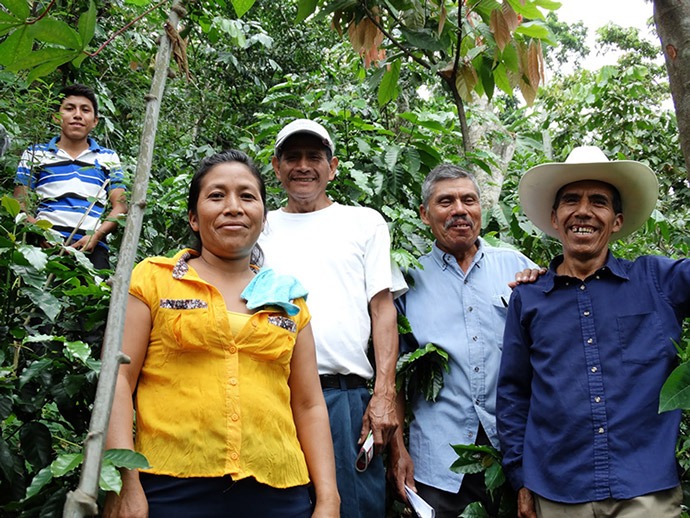
Farming family. Photo: Global Partnerships.
And much of this research demonstrates that one of the most effective ways to make an impact is by investing in women. Evidence shows that women invest as much as 10 times more in the health and well-being of their families. A child is 20 percent more likely to survive and thrive if it is born into a household in which the mother manages the budget. In addition, when women have the same amount of land as men, there is a 10 percent increase in crop yields. Gender equality in agriculture could also reduce the number of undernourished people globally by as much as 150 million.
That’s why all of GP’s investments are benefiting women, even if it’s not within one of their exclusively women-centered initiatives. For instance, even though women do most of the field work and make up nearly half of all smallholder farmers, contextual barriers make it challenging to work directly with women in agriculture. But by investing in enterprises that address the many needs of smallholder farmers – not just improved inputs like fertilizer and seeds, but also credit, technical assistance, and improved market access – GP is able to invest at various points where the supply chain fails to reach and create value for women.
As an example, Aldea Global is one of GP’s partners in Nicaragua that works with lawyers to help farmers wade through the complicated legal process of land acquisition. Once all the correct documents are filed with the local registrar, Aldea Global presents the farmer with a new land title along with a cash grant. Although they don’t work exclusively with women, they do provide support to women, many of whom, as first-time land owners, are able to transform their lives (and those of their families) with newfound independence, self-esteem, and access to financial products and services.
Because coffee is such a major cash crop where GP invests, many of its partners within the “smallholder farmer market access” initiative focus on coffee cooperatives that supply to specialty brands. A couple of its partners – Aldea Global and APROCASSI in Peru – have very successfully engaged with women-only coffee co-ops. APROCASSI’s women’s group, for example, supplies beans to Allegro Coffee, which is sold at Whole Foods.
Still, GP acknowledges that moving agricultural communities toward more gender equity is a slow process that requires shifts in social, cultural, economic and political norms.
“We think that private capital will play a critical role in unlocking opportunities while legal and cultural norms shift, allowing more women to engage in the market,” Bladin said.
As they work toward that, Bladin says GP also has plans to continue expanding. They have reached almost 10 million people since 1994, and Bladin says they’re on track to reach 30 million by 2024. He also hopes they’ll have significantly more outstanding capital in the next decade to invest in enterprises that are scaling up or just getting started.
But perhaps more importantly, Bladin says GP wants to encourage more investors to join them on the “impact-led edge.”
“We want to stay on that edge,” he said. “And we want to raise the profile of telling people there is an edge – that even among impact investors, you can have more of an impact if you’re not exclusively focused on financial returns.”
Back to Top
New Member Profile
Fair Trade USA Shows How Social Impact and Coffee Quality Go Hand in Hand
By: Joanne Lu
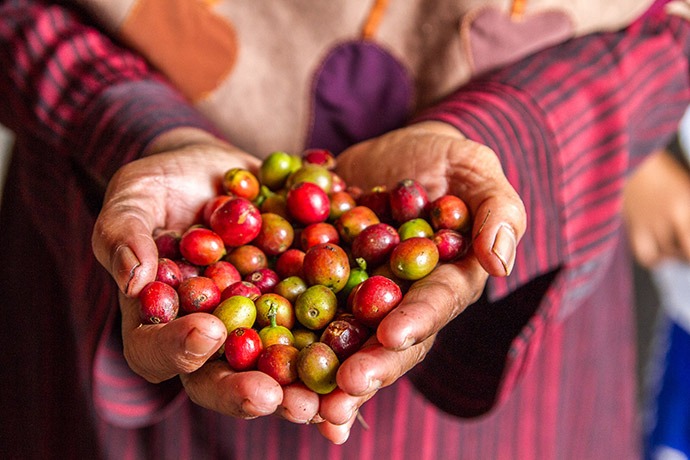
Marliah, a member of a coffee co-op in Aceh, the northern-most province in Sumatra, holds freshly harvested coffee cherries. Photo: Bennett Wetch. © 2015 Fair Trade USA.
Coffee has been at the center of Fair Trade USA since its beginning.
When the nonprofit organization launched in 1998, it had one product – coffee – and just a handful of partner companies. Now, as the leading third-party certifier of Fair Trade products in North America, Fair Trade USA works with more than 1,300 companies to source products and ingredients that foster sustainable livelihoods for farmers and workers and protect the environment.
In its recently announced sustainability standards, the Seattle-based co-op REI even listed Fair Trade USA as a preferred certification for its suppliers.
In addition to coffee, Fair Trade certifies and promotes more than 30 product categories from around the globe, including tea, produce, sugar, cocoa, spices, seafood, apparel, home goods and more. According to the organization, Fair Trade USA and its partners have helped deliver over $500 million in additional economic impact to farmers, workers, and fishermen since 1998.
It all began with a coffee cooperative in Nicaragua. Current President & CEO Paul Rice founded Fair Trade USA after spending 11 years in Nicaragua, where he organized cooperatives and trained farmers. During that time, he helped launch the country’s first Fair Trade organic coffee export cooperative, PRODECOOP. The success of PRODECOOP showed Rice just how transformative it can be when the most vulnerable people along a value chain are treated with respect.
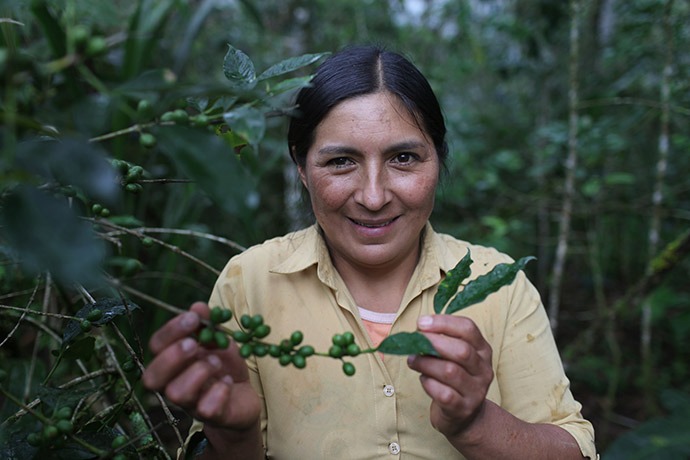
Maria Elva Correa Torres, 40, shows her coffee plants in Cajamarca, Peru.
Photo: James A. Rodriguez. © 2015 Fair Trade USA.
That’s because the length and complexity of traditional value chains often allow unsafe and unfair practices to go unnoticed by consumers and the businesses that sell to them. When companies drive down prices to compete, it’s the farmers and workers whose livelihoods are often cut.
Coffee, in particular, goes through a long and complex process to get from farm to mug: Farmers choose (or are given) trees. They determine where to plant them. The coffee grows as a cherry on a tree. Then, the coffee is harvested – and immediately, its quality begins to degrade. The seed – or “bean” as it’s usually called – is removed from the cherry. The seed is fermented, dried, dried some more, then stored. After a bit, parts of the seed are removed, and it’s stored again. Then, it’s sold, shipped and packaged to sit in in a warehouse, before it’s purchased by a roaster. The coffee then goes through a roasting process, before it’s stored again and bagged. Only then is the coffee ground and brewed for consumption.
According to Fair Trade USA’s Director of Coffee Supply Chain Colleen Anunu, the value addition throughout the whole process sets coffee apart from other cash crops.
“All along these lines there are specific decisions that are made that can impact the quality of the coffee by the time that you drink it,” Anunu said. “It’s really a complex and unreliable trade scheme.”
Although the commercialization of Fair Trade goods began in the 1940s mostly as handicrafts sold in churches and fairs, specialty goods like coffee and chocolate have become prime products in the Fair Trade movement. That demand bolsters the global effort of producers, consumers, certifiers, brands, NGOs and academics to build a more just, transparent and equitable system of global trade. Whereas Fair Trade was initially just focused on rebalancing power dynamics so producers could have more determination in their products and sales, quality and the ability to know the suppliers to some extent now supplement the model.
Fair Trade USA works toward that ideal at various points along the value chain. To make sure the farmers and workers who are producing Fair Trade Certified products are being paid a fair and often above-market price, the organization audits transactions between businesses that sell Fair Trade Certified items and their international suppliers. Additionally, the organization educates consumers about Fair Trade and its impact.
But perhaps the most direct way Fair Trade USA is working to achieve its mission is through its certification process. Producer communities must meet the organization’s strict social, environmental, and economic standards, such as safe working conditions, no child or forced labor, no use of harmful chemicals, and proper waste disposal. When farmers and workers achieve certification, they earn an additional amount of money, called the Fair Trade Premium, with every sale. This fund is then used to address needs within the community.
“The important part is that farmers and workers vote together on how to use this money,” Fair Trade USA’s Director of Marketing and Communications Jenna LeDoux said. “They’re solving their own problems on their own terms.”
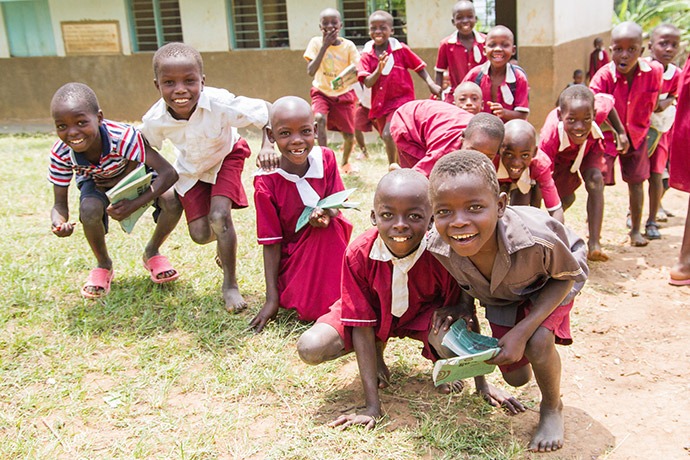
The Gumutindo Coffee Cooperative in Uganda voted to use some of its Fair Trade community development funds to repair the roofs of the local school buildings after a big storm, as well as to purchase school desks. The community development funds also support teacher training.
Photo: Bennett Wetch. © 2015 Fair Trade USA.
Although Fair Trade is a powerful strategy for economic empowerment, there continues to be a discussion on how to promote more gender equity. Especially in long, complex value chains like coffee, women do a majority of the labor but are often overlooked in the distribution of benefits. They do the housework and in some areas a majority of the farm work, as well, but because their husbands and sons primarily own the land and market the product away from home, women don’t usually have a say in how the money is spent or saved. Training, too, is often conducted for landowners who don’t put the learning into practice, because women are often the ones doing the labor.
Even in Fair Trade co-ops, gender imbalance can be prevalent. Many co-ops don’t recognize women as full members, as membership is partly based on land ownership. However, Anunu pointed out that there are levers within the Fair Trade model that are utilized to promote women’s economic and social empowerment, such as the Fair Trade Premium. The funds might be used as an additional payout to farmers, or it may go toward new warehouses, water treatment facilities, smokeless cook-stoves, women’s health screenings or whatever else the community wants the money to be used for.
Fair Trade standards are also applicable where hired laborers (farm and factory workers) are concerned. For instance, Fair Trade has strict standards around sexual harassment, maternity leave, and health and safety, and it also ensures that the Fair Trade committee is representative of the workforce. This means that if women are employed on a farm, women must be represented in the decision-making process around the Fair Trade Premium fund.
If women are able to receive training along with men, they can increase the profitability of products like coffee by engaging in practices that improve quality. Evidence has also shown that when women have a say in how income is spent or saved, the whole household benefits.
Overall, from a production perspective, Fair Trade is driving change through social and environmental standards. On the consumer side, Fair Trade awareness also is at an all-time high – at 63 percent of the U.S. population, according to Fair Trade USA.
But for coffee specifically, Anunu hopes to see more of a shift in the industry over the next decade toward an understanding that quality coffee and Fair Trade coffee aren’t mutually exclusive.
“Direct trade relationships between roasters and growers too often narrowly focus on the coffee quality and just assume there will be positive social impact because of the higher prices,” she said. In fact, these trading schemes can skip important shared values and assurances that are the basis for the Fair Trade model.
“You can’t have social impact and not focus on coffee quality, and vice versa,” she said. “They need each other to thrive.”
Back to Top
Welcome New Members
Please welcome our newest Global Washington members. Take a moment to familiarize yourself with their work and consider opportunities for support and collaboration!
Friendly Water for the World
Friendly Water for the World expands global access to low-cost clean water technologies and information about health and sanitation through knowledge-sharing, training, community-building, peacemaking, and sustainability. It empowers communities abroad to take care of their own clean water needs. friendlywater.net
Northwest Immigrant Rights Project
Northwest Immigrant Rights Project promotes justice by defending and advancing the rights of immigrants through direct legal services, systemic advocacy, and community education. Northwest Immigrant Rights Project strives for justice and equity for all persons, regardless of where they were born. nwirp.org
Breakthrough
Breakthrough is a global human rights organization working to drive the culture change needed to build a world in which all people live with dignity, equality, and respect. Working out of centers in the U.S. and India, Breakthrough uses a potent mix of media, arts, and tech to reach people where they are and inspire them to take bold action to challenge the status quo. The organization often views the most crucial issues of our time through the lens of gender, because it believes that promoting equality for all genders is a pathway to promoting the human rights, and the humanity, of all people. Since 1999, Breakthrough has also worked to promote immigrant rights, racial justice, and the rights of people living with HIV/AIDS. Us.Breakthrough.tv
Fair Trade USA
Fair Trade USA is a nonprofit organization that promotes sustainable livelihoods for farmers and workers, protects fragile ecosystems, and builds strong, transparent supply chains through independent, third-party certification. Its trusted Fair Trade Certified™ seal signifies that rigorous standards have been met in the production, trade and promotion of Fair Trade products from over 50 countries across the globe. fairtradecertified.org
Vulcan
Vulcan Inc. is the engine behind philanthropist and Microsoft cofounder Paul G. Allen’s network of organizations and initiatives. Empowered by Paul’s vision to make a positive difference in the world, Vulcan works to be a catalyst for change. The organization is committed to improving our planet through catalytic philanthropy, inspirational experiences, and scientific and technological breakthroughs. vulcan.com
Back to Top
Member Events
April 18: Greater Seattle Business Association // Business Development Workshop: How to be a seller on Amazon
April 18: World Affairs Council // Global Classroom: Taiwan in the Balance
April 21: OneWorld Now! // Get Global Youth Conference
April 23: Washington Nonprofits // Finance Unlocked for Nonprofits
April 24: University of Washington and Landesa // Roy Prosterman Lecture and Sustainable International Development Alumni Celebration
April 26: University of Washington // Panel | Women’s Economic Rights in India, Liberia, and Myanmar: Issues and Interventions
April 28: Washington Nonprofits // TACOMA: Tools for Running an Effective Nonprofit
May 2: Seattle Metropolitan Chamber of Commerce// Women in Business & Leadership Initiative – Spring Symposium 2018
May 2: Washington Nonprofits // ONLINE: 10 Tips to Use Video to Fuel Your Fundraising and Marketing
May 7: Seattle University // Peter L. Lee Endowed Lecture in East Asian Culture and Civilization
May 8: Washington Nonprofits // Social Media 101 for Nonprofits
Back to Top
Career Center
Highlighted Positions
Associate Scientist, Intellectual Ventures
Program Officer, International Visitor Program, World Affairs Council
Communications Coordinator, Seattle International Foundation
Innovation Manager, Impact Lab, PATH
Check out the GlobalWA Job Board for the latest openings.
Back to Top
GlobalWA Events
April 17: Networking Happy Hour with Friends of GlobalWA, WGHA and World Affairs Council
April 19: Women Hold Up Half the Cup – Empowering women in coffee-growing regions of the world
April 25: How data and technology can advance the Sustainable Development Goals (SDGs)
Back to Top
Oxfam America Announces Fatema Z. Sumar as New Vice President of Global Programs
Posted on April 11, 2018.
Today, international development and anti-poverty organization Oxfam America announced that Fatema Z. Sumar is joining Oxfam’s Senior Leadership Team as Vice President of Global Programs.
Ms. Sumar joins Oxfam America following a distinguished career in the U.S. government where she led U.S. efforts to advance sustainable development and economic policy in emerging markets and fragile countries. Most recently, Ms. Sumar served as Regional Deputy Vice President for Europe, Asia, Pacific, and Latin America at the U.S. Millennium Challenge Corporation (MCC), where she managed investments focused on international growth and poverty reduction. Prior to MCC, she served as the Deputy Assistant Secretary for South and Central Asia at the U.S. Department of State and as a Senior Professional Staff Member on the U.S. Senate Foreign Relations Committee under Chairman John Kerry.
Read more: https://www.oxfamamerica.org/press/oxfam-america-announces-fatema-z-sumar-as-new-vice-president-of-global-programs/















